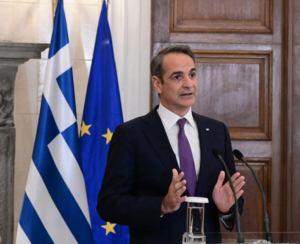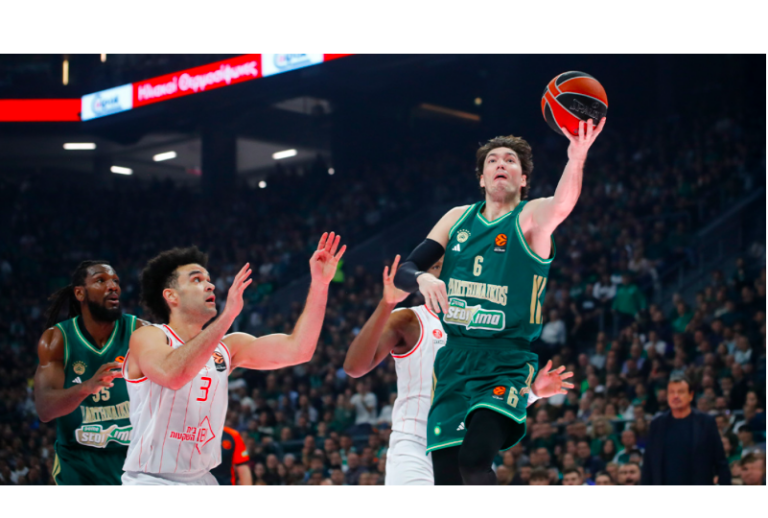Mitsotakis’ Statements
“We jointly recognized that, in facing modern challenges, we must build bridges of cooperation with our partners. We must move forward with faith in the principles of democracy and freedom, ensuring the respect of International Law and international agreements, which is especially important in the sensitive region of the Western Balkans.
The missile defense shield is more relevant than ever, and we should discuss how this necessity can be put into practice.
We discussed Greece’s constructive role, which is recognized as a pillar of stability and security on NATO’s southeastern flank.
I hope the negotiations for a ceasefire in southern Lebanon will be successful, so that the front can close as soon as possible.
Support for Ukraine must continue, especially with the winter approaching. Our country remains firmly on the side of the defenders.
We agreed on one of the fundamental positions, the need to strengthen our common defense.
We invest 2% of our GDP, even in difficult times.
Earlier, Mark Rutte visited the Ministry of National Defense, where he met with Nikos Dendias, and the Ministry of Foreign Affairs, where he had a meeting with Giorgos Gerapetritis.
Upon his arrival at Maximos, the NATO Secretary General even interacted with Pinat, the Prime Minister’s dog, and gifted him some treats.”


NATO Secretary General Mark Rutte passed through the entrance of the Great Maximus Palace a few minutes after 12 noon, making a stopover in Athens today of intense geopolitical interest as the Dutch polymath is called upon to manage the complex geopolitical balances, the new round of flare-ups in Ukraine amidst nuclear threats, and the new realities that are emerging in the wake of Trump’s election in the US.
Earlier, Mark Rutte was at the Ministry of National Defence, where he met with Nikos Dendias, and at the Ministry of Foreign Affairs, where he had a meeting with Giorgios Gerapetritis.
Kyriakos Mitsotakis and Mark Rutte know each other not only from their joint tenure on the EU summit council. Mitsotakis was one of the first leaders to support Rutte’s candidacy, with the two men meeting last December and even taking a walk through the icy streets of The Hague.
In that sense, it doesn’t take much time to break the ice or to get to the heart of the debate. And it is given that the discussion will have “a lot” of Ukraine in it, as the situation on the ground is the “hot potato” for the Alliance, following Vladimir Putin’s new missile power projection.
NATO is looking for ways to bolster Kyiv’s defenses, though the new direction from across the Atlantic is that peace on the ground must come immediately. Of course, with Russia’s moves, the prospect of a ceasefire “within 24 hours”, as Donald Trump has said, seems utopian to say the least. Notably, Mr. Rutte, who was in Ankara yesterday, met with Mr. Trump on Saturday in Mar-a-Lago, Florida.
“Don’t let Ukraine lose any more territory”
Recall that days ago, in a discussion with French writer Pascal Bruckner, Kyriakos Mitsotakis identified the West’s revised goals on the Ukraine front. “Possible peace between Russia and Ukraine cannot be the result of Ukraine’s capitulation. Of course, talking about a Ukrainian victory may sound too optimistic, but we must at least allow Ukraine to defend itself and not lose more territory. If one wants to be realistic, this is exactly what we are trying to achieve at the moment,” Mitsotakis underlined. However, Greece has made it clear in all tones that it is not involved in arming Ukraine at the expense of Greek defense.
Terms and autonomy
In this environment, the defense spending of the Alliance members takes on a new interest, given the US direction for its rapid increase. “For us, the debate is not our concern because we spend 3% of our GDP. 23 of the 32 NATO countries are now spending 2%, after the developments in Ukraine,” protothema.gr government source underlines in protothema.gr, in support of the analysis that our country enters the debate from a position of strength.
Mitsotakis, however, is expected to use the debate to once again send a message in favor of Europe’s self-defense strategy in the wake of the US elections. The prime minister has taken a strong stance in this debate, also proposing at a European level, along with Polish Prime Minister Donald Tusk, to leverage European resources to build an anti-aircraft dome.
Given the opportunity, Mitsotakis has consistently reiterated that the era of strategic naivety for Europe is over, so the time for decisions on common defense has come. Something that, of course, is of particular concern to NATO.
Ask me anything
Explore related questions





